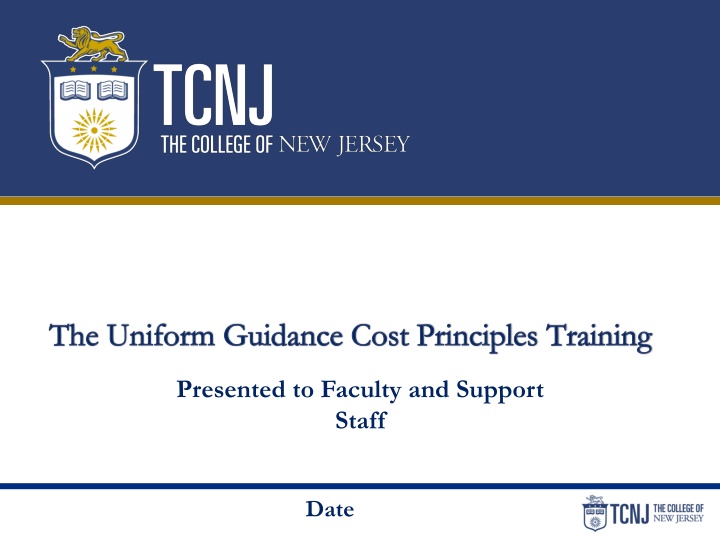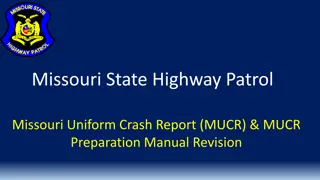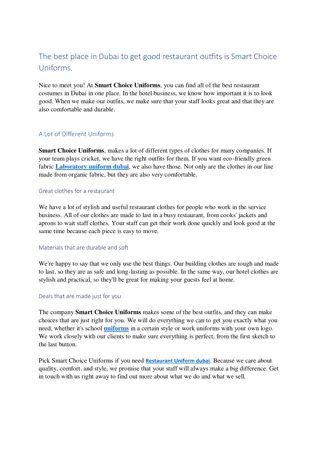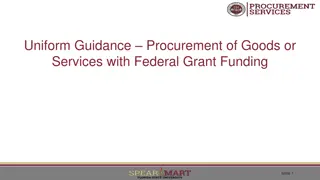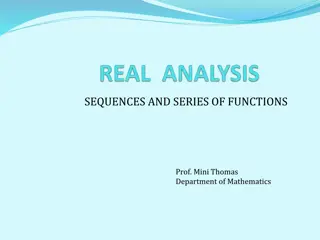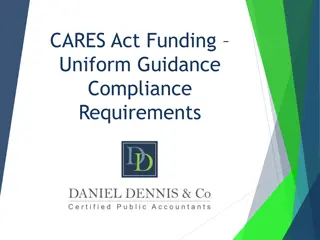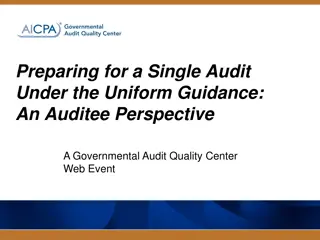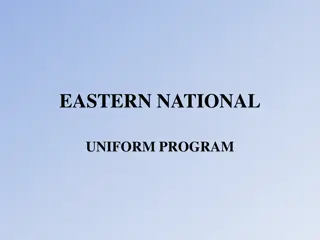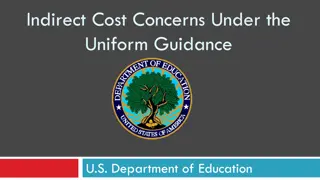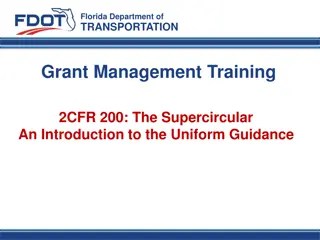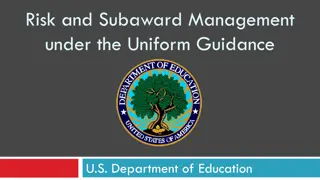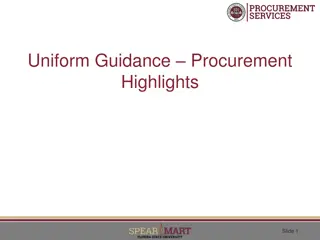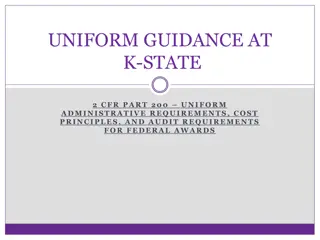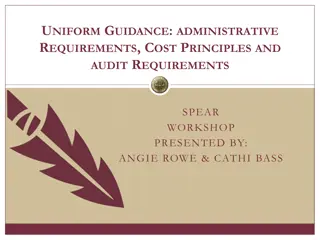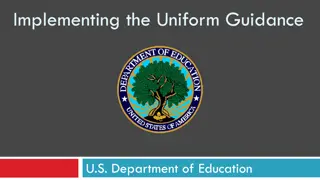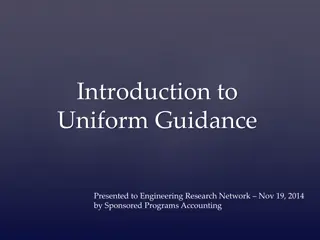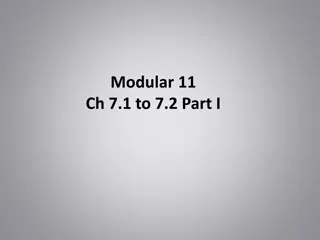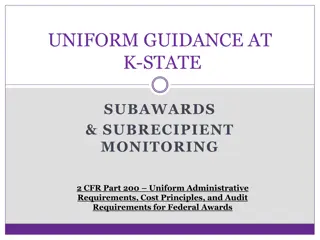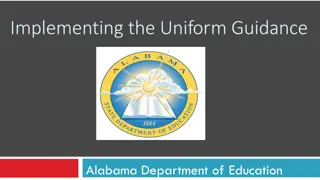Insights into Uniform Guidance Regulations
This training presentation delves into the Uniform Guidance Cost Principles, outlining changes, compliance requirements, and responsibilities related to allowable charges and cost transfers. It emphasizes the impact on sponsored projects and institutional policies, offering key takeaways and resources for reference.
Uploaded on Mar 14, 2025 | 2 Views
Download Presentation

Please find below an Image/Link to download the presentation.
The content on the website is provided AS IS for your information and personal use only. It may not be sold, licensed, or shared on other websites without obtaining consent from the author.If you encounter any issues during the download, it is possible that the publisher has removed the file from their server.
You are allowed to download the files provided on this website for personal or commercial use, subject to the condition that they are used lawfully. All files are the property of their respective owners.
The content on the website is provided AS IS for your information and personal use only. It may not be sold, licensed, or shared on other websites without obtaining consent from the author.
E N D
Presentation Transcript
The Uniform Guidance Cost Principles Training Presented to Faculty and Support Staff Date 0
Agenda and Outcomes Agenda Introductions Background on the Uniform Guidance: Introduction to Sponsored Project Compliance, Overview and Institutional Impact The Basic Idea Cost Principles: Cost Principles, Cost Transfers Processes Roles and Responsibilities Practice Activities Key Takeaways Resources Outcome: After this training we expect that you have an understanding of the Uniform Guidance and the changes to the regulations for allowable charges, direct charging and cost transfer (aka transfers). You will know your responsibilities, and know where to find answers to any questions that may arise. 1
1. Background on The Uniform Guidance 2
Background on Uniform Guidance OVERVIEW OF CHANGES The Uniform Guidance includes a combination of: Current Language from Existing Circulars Revised Language of Existing Circulars New Language The final guidance which went into effect December 26, 2014 superseded requirements from: OMB Circulars A-21, A-87, A-110, and A-122 (which have been placed in 2 C.F.R. Parts 220, 225, 215, and 230), Circulars A-89, A-102, and A-133 The guidance in Circular A-50 on Single Audit Act follow-up What Changed? What Remained the Same? Combined 8 Circulars into 1 Adjusted and revised the language and added new language Granted greater flexibility to the recipient Placed greater emphasis on institutional policies and internal controls In many respects the guidance remains unchanged However, just the change itself will result in increased scrutiny because of the renewed awareness and focus 3
Introduction to Sponsored Project Compliance PERSPECTIVE ON THE CURRENT INDUSTRY LANDSCAPE The sponsored project administration environment grows increasingly complex with changing regulations, inconsistencies among agencies, lack of information (meaningful and timely reports), thus generating more risk than institutions recognize. There remains a vast disconnect between: The award environment, during which the funding agency and the PI focus primarily on the programmatic work itself The degree of flexibility that is perceived to exist while the work is being conducted The audit environment during the life of award through when an award is closed and subsequent audits take place The current environment will likely place increased emphasis on accountability during a time when many institutions are faced with significant financial strain and pressures to reduce staff. PIs are being held to a higher standard to follow regulations. The OAGSR and Office of the Treasurer will provide oversight and answers to questions but cannot perform the work for all PIs. 4
Introduction to Sponsored Project Compliance EMPHASIZED COMPLIANCE ISSUES Diverging fiscal and regulatory compliance issues creates a complex charge for the sponsored project compliance program. Fiscal Cost Transfers Clinical Trial Billing Other Support Cost Sharing Direct charging practices Recharge Centers Effort Reporting Equipment Claims Program Income Reporting Unallowable Costs Extra Service Compensation Financial Reporting Regulatory Export Controls Scientific Overlap Animal Subject protections (IACUC) Human Subject protections (IRB) HIPAA Privacy Laws Scientific Misconduct Conflicts of Interest Sub-recipient Monitoring Invention Disclosures and Reporting Environmental Health & Safety Responsible Conduct of Research 5
Overview of Uniform Guidance & Institutional Impact EFFECTIVE DATES EXISTING AWARDS & GUIDANCE Existing Awards Pre-Existing Guidance Once the Uniform Guidance goes into effect for non-Federal entities, it will apply to Federal awards or funding increments after that date. It will not retroactively change the terms and conditions. Entities will likely make changes to their own policies and procedures that will impact their existing/older awards. Non-Federal entities wishing to implement entity-wide system changes to comply with the Uniform Guidance after the effective date of December 26, 2014 will not be penalized for doing so. TCNJ has adopted policies and procedures that impact existing awards. The terms and conditions for Federal awards (i.e. 2 CFR 220, 225, and 230) always govern. Now that the Uniform Guidance is in effect, Federal agencies still need to ensure the continued availability of access to the terms and conditions of Federal awards made prior to the Uniform Guidance becoming effective. 6
Overview of Uniform Guidance & Institutional Impact COST PRINCIPLES - DIRECT COSTS Guidelines promote the clarification as well as standardization of the direct cost allowability across institutions. FINAL OMB UNIFORM GUIDANCE Further clarifications made in allocability and allowability of certain direct costs. INSTITUTIONAL IMPACTAND IMPLICATIONS A single common cost principles circular creates common accounting standards for all grant recipients, regardless of institutional type. 7
Overview of Uniform Guidance & Institutional Impact COST PRINCIPLES - ADMINISTRATIVE SUPPORT Institutions can charge directly allocable administrative support as a direct cost. FINAL OMB UNIFORM GUIDANCE In order for clerical costs to be allowable as a direct charge, the Federal awarding agency s prior approval is required. INSTITUTIONAL IMPACTAND IMPLICATIONS Institutions may charge administrative and clerical salaries, as well as other items of cost, directly to a Federal award when it is appropriate, allocable and meets the conditions outlined in the Federal guidance. Additional language was added to allow for this approval after the initial budget approval in order to allow for flexibility in implementation. The burden for justifying direct costs as allocable to an award remains with the institution. 8
Overview of Uniform Guidance & Institutional Impact COST PRINCIPLES - COMPUTING DEVICES This change includes the cost of certain computing devices as allowable direct cost supplies. FINAL OMB UNIFORM GUIDANCE Computing devices are subject to the less burdensome administrative requirements of supplies (as opposed to equipment). INSTITUTIONAL IMPACTAND IMPLICATIONS Computing devices not considered a depreciable asset by an institution s capitalization policy may be charged and treated as supplies. The acquisition cost must be less than the lesser of the capitalization level established by the non- Federal entity for financial statement purposes or $5,000, regardless of the length of its useful life. The burden of obtaining prior approval for such purchases is reduced. However, institutions must follow the same practices for determining and documenting allocability (direct versus indirect use) when charging computing devices to sponsored awards. 9
2. Cost Principles 10
Cost Principles UNIFORM GUIDANCE The Uniform Guidance (and previous Circulars) establishprinciples for determining costs applicable to Federal grants, contracts, and other agreements. Term Definition Goods or services acquired and amount involved reflect an action a prudent person would have taken. Reasonable Allocable Benefits the project or award that was charged. Items not restricted by federal regulations or the specific grant/contract. Allowable Treated Consistently Like costs in similar circumstances need to be charged directly or indirectly at the institution. Costs that do not meet these standards should not be charged to a sponsored project. 11
Cost Principles COST ACCOUNTING STANDARDS AND SPONSORED PROJECT COSTS How do the Cost Accounting Standards apply to sponsored project costs? Any costs charged to federally sponsored awards are classified as: Direct Costs F&A / Indirect Costs However, most institutions apply the federal cost principles to all sponsors, which include both federal or non-federal. 12
Cost Principles DIRECT VS. INDIRECT COSTS Cost Types / Purpose Personnel: Salaries, wages, fringe benefits Materials & Supplies: Goods needed to conduct the project Purchased Services: Services needed to conduct the project Equipment: Capital equipment purchases Subcontracts: Work performed by other institutions Other Direct Costs Direct Costs Those costs that can be identified specifically with a particular sponsored project or that can be directly assigned to an activity relatively easily with a high degree of accuracy. Depreciation or use allowances on buildings and equipment Costs of operating and maintaining facilities Administrative activities (HR, payroll, accounting, executive management) Sponsored projects administration (Pre and Post award) Department administrative activities Library operations Facilities & Administrative Costs Costs that are incurred for common or joint objectives and therefore cannot be identified readily and specifically with a particular sponsored project or other activity. 13
Cost Principles THE CHALLENGE OF ADMINISTRATION COSTS General office supplies (e.g., pencils, paper, staples, etc.) or general purpose computer supplies (e.g., paper, toner, general purpose software) should be charged to general or other non-sponsored accounts Salaries associated with normal administrative activity should be charged to general or other non-sponsored accounts Proposal Preparation Accounting Purchasing Data Entry Administrative and Clerical Salaries Office Supplies Office telephone lines and individual cell phones are typically general-use and should be charged to general or other non- sponsored accounts. Regular postage should be charged to general or other non-sponsored accounts Postage Telephones 14
Cost Principles EXCEPTIONS FOR UNLIKE CIRCUMSTANCES The examples of indirect costs mentioned on the previous slides may be directly charged to a sponsored award when they directly benefit the sponsored project this is typically when unlike circumstances apply. Unlike circumstances generally exist when a sponsored project or activity, due to its size and nature, requires administrative or clerical services, supplies, postage and/or telecommunications costs that are well beyond the core use routinely provided for with non- sponsored/administration funds. When it is ok to charge to a grant directly: 1) Administrative or clerical services are integral to a project or activity; 2) Individuals involved can be specifically identified with the project or activity; 3) Such costs are explicitly included in the budget or have the prior written approval of the Federal awarding agency; and 4) The costs are not also recovered as indirect costs. 15
Cost Principles EXCEPTIONS FOR UNLIKE CIRCUMSTANCES Excessive amounts of administration (conference travel arrangements) or data entry (survey translation) are required. There is a high volume need for the supplies Any allocation for supplies on multiple projects is reasonable and documented appropriately Specific-purpose computer software is required Administrative and Clerical Salaries Office Supplies The size and nature of the project requires extensive use of telephones (work in the field ). Long distance telephone service costs (to international collaborators) can be identified and allocated appropriately to the project or projects that received the benefit The costs are reasonable and necessary to perform the project Telephones There is a high demand for postage (mass mailings) A meter or log is used to document the appropriateness of the charge to the sponsored project(s) Overnight mail costs (e.g., FedEx, UPS) for expedited shipping of materials/samples Postage 16
Cost Principles UNIFORM GUIDANCE IMPACT ADMINISTRATIVE SALARIES The OMB Uniform Guidance clarifies that administrative and clerical support salaries can be charged directly to a sponsored project as an allowable cost. Pre-Uniform Guidance Uniform Guidance Changes Overall Impact Salaries for administrative and clerical support staff were treated as indirect costs on sponsored projects, unless they were specifically designated as a component of a major project or unlike circumstances prevailed. If these costs are allocable, they can be directly charged, requiring no project designation Prior approval must be obtained by the federal award agency or listed in the proposed budget Burden for justifying direct costs as allocable to an award remains with the institution Institutions can (still!) directly charge these costs to a federal award when it is appropriate and allocable. This may better serve investigators, as their sponsored awards will likely benefit from the added skills and support of administrative and clerical staff. 17
Cost Principles UNIFORM GUIDANCE IMPACT COMPUTING DEVICES Additionally, the Uniform Guidance allows computing devices to be directly charged to an award as supplies, if this cost is allowable and allocable to the specific project.. Pre-Uniform Guidance Uniform Guidance Changes Overall Impact Computers and other similar devices were not allowable as a direct cost on an award, unless they were essential to the project and pre- approved in the budget Computing devices that are essential and allocable, but not solely dedicated to the performance of the award, are allowable as a direct cost without the awarded agency s approval An institution may now classify and treat these items as they would supplies rather than capital equipment Institutions are no longer required to obtain special permission in order to charge computing devices directly to a sponsored project (as equipment) However, institutions must follow the same practices for determining and documenting allocability of these costs when charging computing devices to sponsored awards 18 18
Cost Transfers INTRODUCTION WHAT IS A COST TRANSFER? Any cost that is first charged to one account and later charged to another account, where one or both of the accounts is a grant or contract, is referred to as a cost transfer, the uniform guidance refers to these as cost allocations Reclassification of charges within an award from one Account Code to another Account Code are not cost transfers But be careful . Reclassifications should not be made in an effort to make an unallowable cost allowable Cost transfers can be: Salary expenditures Non-Salary expenditures Cost transfers are a necessary and required component to managing sponsored projects, but they should be kept to a minimum! 19
Cost Transfers INTRODUCTION WHAT IS A COST TRANSFER? Considerations and examples of cost transfers include: Differences between actual effort % and % of salary charged may require a cost transfer Important to ensure that a review of effort and follow-up procedure occurs at your institution Cost transfers processed after verification may require a re-verification of effort If cost transfer results in an increase to the charge to a sponsored program, this is especially important 20
Cost Transfers INTRODUCTION WHAT ARE COMMON CAUSES OF COST TRANSFERS? If a cost has been charged to the incorrect project and needs to be moved to the correct project. Data entry error Reallocation of effort Costs incurred prior to award notification but within grant term You should have a notice to proceed Cost transfers are NEVER an award management tool and should not be used to balance out accounts. Under no circumstances may a Cost Transfer be made with the sole intent of using up the unexpended balance in a Federal account or clearing a Federal account overdraft. 21
Cost Transfers COMPLIANCE RISK Cost transfers are consistently a very hot topic in sponsored projects administration Continually a focus of Federal sponsor s Office of Inspector General work plans A key focus area of other auditors (Single Audit) A high volume of cost transfers suggests a lack of proper award management and raises questions on internal accounting practices and controls, such as: Charging awards for costs that they did not benefit from in a proportional way Lack of expenditure monitoring Charge holding or balance floating Poor spend planning 22
Cost Transfers STRATEGIES FOR RISK MITIGATION Charge the proper account initially - carefully double-check data entry Monitor spending and balances on accounts and review with PIs at least quarterly Keep cost transfers to a minimum Document a complete explanation and justification (for example, use a Cost Transfer Justification Form ) Explanations such as to correct an error or to transfer to correct project generally are not sufficient Document, document, document! Process cost transfers within 90 days after discovering the need for one Provide additional information when transfer is not made within the 90 day period Be timely Verify with PIs that costs charged to an account actually benefit the award Help PIs ensure charges are allowable, allocable, reasonable, and consistently treated across all awards for like charges Transfer appropriately 23
Cost Transfers STRATEGIES FOR RISK MITIGATION Avoid the following practices: Charging a cost to one sponsored award while waiting for another award to come in or be set-up in financial system Posting a cost share charge directly to the grant until cost share funds can be identified Charging one project for an item that benefits multiple grants because more funding is available there than on other projects Transferring costs to use up an unspent balance at the end of an award Transferring costs to avoid the 25% carryover approval requirement Transferring costs from one sponsored project to another to clear an overdraft 24
Cost Transfers COMPLIANCE RISK - COMMON RED FLAGS The following list includes common red flags related to cost transfers that signal compliance concerns to potential auditors. Transfers older than 90-120 days after original transaction Transfers in the last month of the award or after the award has expired Large numbers of cost transfers Grants or contracts with an exact zero balance at the end of the award Round numbers (may be an indicator of a plugged number) Paying summer/periodic salary late (e.g. in December) Labor distribution adjustments to previously verified effort 25
3. Processes 26
Processes ALLOWABLE COSTS 1. The Principal Investigator reviews an applicable grant announcement, with particular attention to allowable cost parameters for budget development. 27
Processes ALLOWABLE COSTS 2. The Principal Investigator, in consultation with the Office of Academic Grants and Sponsored Research (OAGSR), as necessary, develops a budget to support a proposed project and submits the draft budget to OAGSR for review. 28
Processes ALLOWABLE COSTS 3. The OAGSR reviews the proposed budget for consistency with the grant announcement parameters and the Subpart E Cost Principles of 2 CFR 200. 4. The cognizant school dean and department chair review the full proposal, including the proposed budget after it has been reviewed by OAGSR and deemed acceptable to advance. 5. The Principal Investigator consults with the Office of the Treasurer in ensuring that any proposed cost transfers comply fully with the grant announcement and the Subpart E Cost Principles of 2 CFR 200. 29
Processes DIRECT CHARGING 1. Principal Investigator (or other support personnel) identifies the need for and purchase goods and services to conduct work on TCNJ sponsored projects. 2. The Office of Academic Grants and Sponsored Research reviews the paperwork and assists the PI in determining the appropriateness of the proposed allocation methodology, and assists the PI in determining if prior sponsor approval is required. Allowable per sponsor/grant contract terms? Charge the expense to the award! Allowable under TCNJ policy? Yes Yes NO NO STOP 30
Processes DIRECT CHARGING 3. Principal Investigator (or other support personnel) determines the charge is either a direct or indirect cost based on how it benefits the project; and, if a direct charge, the PI (or other support personnel) confirms the cost is in compliance with the Cost Principles. Cost Types / Purpose Direct Costs Personnel: Salaries, wages, fringe benefits Those costs that can be identified specifically with a particular sponsored project or that can be directly assigned to an activity relatively easily with a high degree of accuracy. Materials & Supplies: Goods needed to conduct the project Purchased Services: Services needed to conduct the project Equipment: Capital equipment purchases Subcontracts: Work performed by other institutions Other Direct Costs Facilities & Administrative Costs Depreciation or use allowances on buildings and equipment Costs that are incurred for common or joint objectives and therefore cannot be identified readily and specifically with a particular sponsored project or other activity. Costs of operating and maintaining facilities Administrative activities (HR, payroll, accounting, executive management) Sponsored projects administration (Pre and Post award) Department administrative activities Library operations 31
Processes DIRECT CHARGING 4. Principal Investigator (or other support personnel) identifies and documents the appropriate transfer methodology, Project ID, and Account Code to which to charge a particular cost. 5. Principal Investigator (or other support personnel) completes the requisition/grant personnel hiring paperwork, including charging instructions. Grant Authorization for Employment Not for use for initial appointment. Please submit a minimum of two weeks before hiring an employee. This form supersedes all previously submitted forms. Action (Please check appropriate box): Change in Chartfield Reappointment Merit Increase *ref below If retro pay, please note distribution of retro pay (under Distribution in start date type RETRO PAY) Employee Name: Title of Position: Grant Title: Full-time (account 51200) Part-time (account 51210) Hours per Week: Current Salary FT/PT: Department: Proposed Salary FT/PT: Supervisor: OR Rate for Hourly Employee Hourly Employee Budget not to Exceed Position # Check Here if 10 month Employee Check Here if Hourly Employee** **Hourly Employees will submit time cards to Payroll for each pay period. Supervisor/PI will approve each time card prior to submission. Distribution: Automatic Calculation - DO NOT TYPE IN THIS BOX Start Date: must be beginning of pay period - # of Pay Periods: $ - End Date: Bi-weekly Rate: $ - ACTUAL AMOUNT TO BE PAID: Percentage Account Fund Dept ID Class Program Proj/Grant Grant End Date *Qualifications/Procedures for Merit Increase: Has evaluation been performed and submitted to HR? If so, has merit increase been approved. Increase will not be processed without a completed evaluation If merit increase form must be submitted to HR prior to being sent to Finance and Business Services If retro pay, please note distribution of retro pay (under distribution in start date type RETRO PAY) Approvals: (1) Principal Investigator; (2) Dean of theSchool if including Department or Enterprise Chartfields; (3) Office of the Treasurer/PAGA (Post Award Grant Accounting ) Green Hall 207; (4) Human Resources for approval and to be entered into EIS. NOTE: This form does not require approval by the Office of Academic Grants and Sponsored Research Principal Investigator Date Office of the Treasurer PAGA (Post Award Grant Accounting) (For Budget Approval Only) Date Dean Date Academic Affairs (For Enterprise Only) Date Rev. 10-2-15 32
Processes DIRECT CHARGING 6. As necessary, Principal Investigator consults with the Office of the Treasurer regarding any requests for direct charging typically indirect expenditures under unlike circumstances. 7. Principal Investigator reviews sponsored charges on a regular basis to confirm all charges conform to the cost principles. 33
Processes COST TRANSFERS For All Cost Transfers: 1. Principal Investigator (or other support personnel) identifies need for cost transfer on sponsored project during quarterly review and reconciliation of award. 34
Processes COST TRANSFERS For All Cost Transfers: 2. Principal Investigator (or project administrative support personnel) completes Journal Entry Request Form within the 90 days of the month-end close of the original transaction identifying the amount to be transferred and applicable Project ID and Account Codes, and providing appropriate justification for transfer. 35
Processes COST TRANSFERS For All Cost Transfers: 3. The Office of the Treasurer reviews the request to verify that funding is available/allocated, the expense is appropriate in accordance with the OMB Uniform Guidance, the justification is sufficient, and the appropriate authorization has been obtained, and processes the cost transfer if approved. 36
Processes COST TRANSFERS Additional Procedures for Cost Transfers Outside of the 90-Day Timeframe: 1. If a cost transfer is requested outside of the 90-day timeframe and, hence, is considered late, the Principal Investigator (or project administrative support personnel) requests approval from the appropriate dean to approve the submission of a formal request for a late cost transfer. 37
Processes COST TRANSFERS Additional Procedures for Cost Transfers Outside of the 90-Day Timeframe: 2. Upon receiving approval from the appropriate dean, the PI submits a request in writing (e.g., via memo or email) to the Office of the Treasurer with details and justification, and indicating prior approval of the dean for submission. Deans must be copied on all written requests for late cost transfers. a. If approved, the Office of the Treasurer processes the journal entry to complete the cost transfer. b. If disapproved, the Office of the Treasurer coordinates with the PI/project administrative support staff to identify an alternate non-sponsored source of funds and transfers the cost to the alternative project. 38
4. Roles and Responsibilities 39
Roles and Responsibilities PRINCIPAL INVESTIGATOR IS RESPONSIBLE FOR: Complying with the grant announcement regarding cost parameters in developing and proposing a project budget. Being aware of the Subpart E Cost Principles in 2 CFR 200 that pertain to allowable costs. Consulting with OAGSR, as needed, in the interpretation and application of the Subpart E Cost Principles during the budget development process. Ensuring actual sponsored project and cost share expenditures comply with the allowability requirements. Understanding federal and sponsor regulations applicable to his/her award portfolio (at a high level), as well as TCNJ policy and procedure. Ensuring that direct and indirect costs are appropriately identified, budgeted, and consistently charged to sponsored projects. Determining and documenting transfer methodologies. Identifying the appropriate Project ID and Account Codes when requesting charges on sponsored projects. Reviewing sponsored project accounts on a regular basis and identifying when cost transfers are required. 10. Completing the Journal Entry Request Form with appropriate documentation that explicitly states how the cost benefited the sponsored project being debited. 11. Providing the additional justification and details and obtaining the necessary approvals if a cost transfer is being requested outside of the 90-day timeframe. 12. Routing the request to the dean and the Office of the Treasurer for approval and processing. 1. 2. 3. 4. 5. 6. 7. 8. 9. 40
Roles and Responsibilities PROJECT ADMINISTRATIVE SUPPORT STAFF ARE RESPONSIBLE FOR: 1. Assisting the PI in reviewing proposed costs for consistency with the grant announcement and the Subpart E Cost Principles. 2. Assisting the PI in reviewing actual sponsored project and cost share expenditures for compliance with the allowability requirements. 3. Serving as a resource for the PI in determining how costs should be budgeted and assigned to sponsored projects. 4. Supporting the PI in documenting unlike circumstances and transfer methodologies, and making purchases on sponsored projects. 5. Assisting the PI in reconciling sponsored project accounts on a regular basis and identifying when cost transfers are required. 6. Assisting the PI in completing the Journal Entry Request Form with appropriate documentation that explicitly states how the cost benefited the sponsored project being debited. 7. Assisting the PI in routing the request to the Dean and the Office of the Treasurer for approval and processing. 41
Roles and Responsibilities DEPARTMENT CHAIR/DEANS ARE RESPONSIBLE FOR: 1. Reviewing and approving the proposed budget (as part of the total grant proposal) in the eGrants system. 2. Reviewing and approving Journal Entry Request Forms and requests for cost transfers outside of the 90-day timeframe to ensure the justification is sound and to monitor cost transfer activity within the school. OFFICE OF ACADEMIC GRANTS AND SPONSORED RESEARCH (OAGSR) 1. Reviewing sponsored project budgets and ensuring charges are appropriately reflected as direct and indirect charges. 2. Assisting the PI in requesting prior approval for specific items of cost when required. 42
Roles and Responsibilities OFFICE OF THE TREASURER IS RESPONSIBLE FOR: Reviewing requests for cost transfers to ensure that such transfers are compliant with the grant announcement and the Subpart E Cost Principles of 2 CFR 200. Establishing the unique Project ID and corresponding Account Codes for use by the PI in charging costs to sponsored projects. Reviewing and approving purchase/grant employee hiring requests, including charging instructions, in accordance with sponsor requirements. Serving as a resource for the PI regarding how incurred costs should be charged to sponsored projects. Documenting transactions in compliance with this policy, and retaining documentation, justification, and back-up for transactions. Collecting post-audit examples, where they exist, of documentation for unlike circumstances for direct charging typically indirect expenditures. Reviewing Journal Entry Request Forms and relevant documentation to ensure that they are completed appropriately. Verifying the debit project has available funding and budget for the transfer. Ensuring all paperwork has been submitted and verifying all cost transfer approvals are in place. 10. Processing the journal entry to process the approved cost transfer in PeopleSoft. 11. Reviewing requests for cost transfers outside of the 90-day timeframe for appropriateness and approving only those cost transfers that would be considered compliant in accordance with TCNJ policy and federal regulations. 1. 2. 3. 4. 5. 6. 7. 8. 9. 43
5. Practice Activities 44
Practice Activities ACTIVITY 1 Conundrum: An organization uses a 6-month effort payroll verification period. Dr. Patterson worked only the first month of the period on Federal Award A at 17%. At the end of the period, the effort report showed 17% incorrectly attributed to Federal Award B instead of Federal Award A. Professor Patterson makes the correction on the effort report to fix the error. The resulting cost transfer will be well over 90 days. What is the optimal course of action? Payroll must be transferred off Federal Award B Institutional leadership must decide whether to allow a 90-day exception to transfer expense to Federal Award A. There are no exceptions offered in federal policy, but some institutions allow late transfers on an exception-only basis. Although cost transfers and effort reporting is linked, effort reporting should generally not be the only instrument to drive salary cost transfers. 45
Practice Activities ACTIVITY 2 COST TRANSFER REQUESTS Acceptable or Unacceptable Request Justification? Section 1 Identification of Cost: Personnel Costs Non-Personnel Costs Please transfer the $100 charge for equipment. Section 2 Justification for Transfer Specifically, explain why the expense(s) was not originally charged to the correct project. I incorrectly charged project F1234 instead of F1235. This was a data-keying error that I noted once the month closed and we reconciled our accounts. Section 3 EXCEPTION Late Cost Transfer Request Complete this section in the space provided only if you are requesting the transfer of expenses older than 90 days. Section 4 Certification I certify that the above-mentioned costs are appropriate charges to the project and project to which the costs are being transferred. Example A: Acceptable Dept Grants Admin Date 46 46
Practice Activities ACTIVITY 2 COST TRANSFER REQUESTS Acceptable or Unacceptable Request Justification? Section 1 Identification of Cost: Personnel Costs Non-Personnel Costs Section 2 Justification for Transfer Specifically, explain why the expense(s) was not originally charged to the correct project. Please process this transfer. I have not been able to get to it due to my other priorities. I m so far behind! I have had no time to reconcile my account load. Section 3 EXCEPTION Late Cost Transfer Request Complete this section in the space provided only if you are requesting the transfer of expenses older than 90 days. Section 4 Certification I certify that the above-mentioned costs are appropriate charges to the project and project to which the costs are being transferred. Example B: Unacceptable Dept Grants Admin Date 47 47
Practice Activities ACTIVITY 2 COST TRANSFER REQUESTS Acceptable or Unacceptable Request Justification? Section 1 Identification of Cost: Personnel Costs Non-Personnel Costs Please transfer salary for John Doe for July from F1235 to F1236. His Authorization For Employment Form has been updated with the new project number to prevent future charges from occurring. Section 2 Justification for Transfer Specifically, explain why the expense(s) was not originally charged to the correct project. The budget period for F1235 ended June 30 and the next year of the project, F1236, had not been set-up. In the future, we will request an advance account set-up. Section 3 EXCEPTION Late Cost Transfer Request Complete this section in the space provided only if you are requesting the transfer of expenses older than 90 days. Section 4 Certification I certify that the above-mentioned costs are appropriate charges to the project and project to which the costs are being transferred. Example C: Acceptable Dept Grants Admin Date 48 48
Practice Activities ACTIVITY 2 COST TRANSFER REQUESTS Acceptable or Unacceptable Request Justification? Section 1 Identification of Cost: Personnel Costs Non-Personnel Costs Request of a salary transfers for eight individuals, to/from sponsored projects, some dating back over 16 months. Section 2 Justification for Transfer Specifically, explain why the expense(s) was not originally charged to the correct project. The main reason for this is that two of our accounts are out of money and salaries that were charged to those accounts must be moved." Section 3 EXCEPTION Late Cost Transfer Request Complete this section in the space provided only if you are requesting the transfer of expenses older than 90 days. Section 4 Certification I certify that the above-mentioned costs are appropriate charges to the project and project to which the costs are being transferred. Example D: Unacceptable Dept Grants Admin Date 49 49
